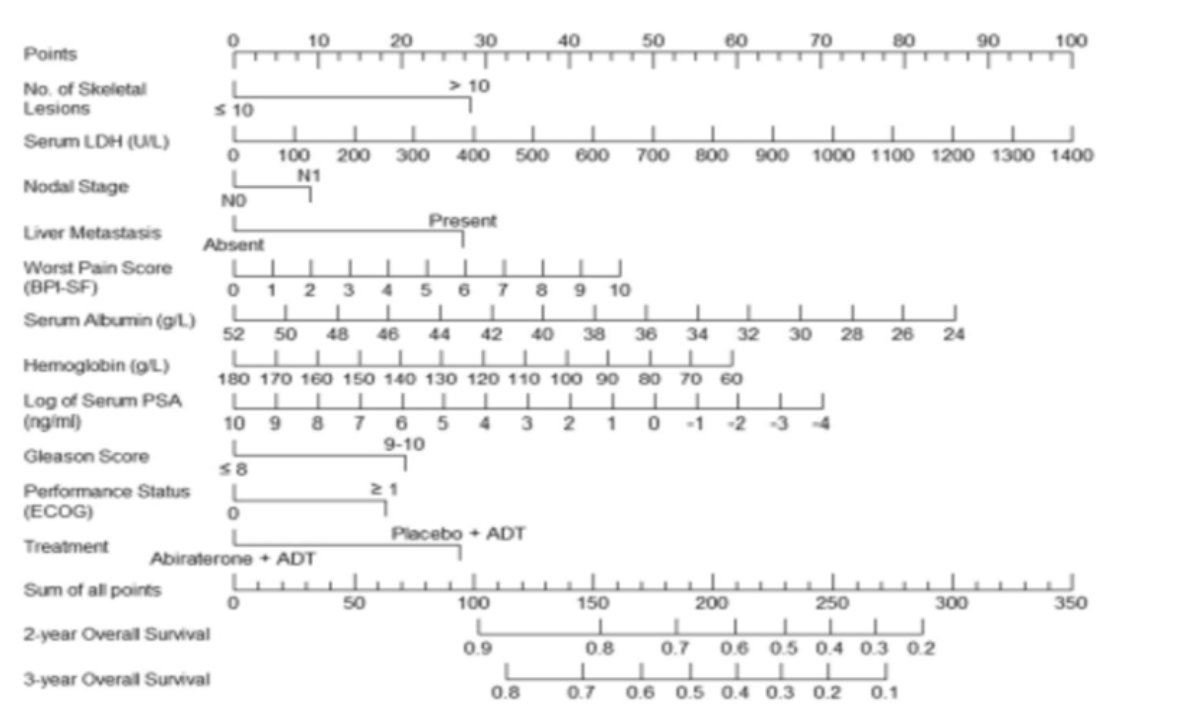(UroToday.com) The 2022 ASTRO annual meeting featured a prostate cancer session, including a presentation by Dr. Shawn Malone discussing the development and validation of a multivariable prognostic model in de novo metastatic castrate sensitive prostate cancer (mCSPC). mCSPC is a heterogeneous disease state with patients having variable prognosis. Although several life-prolonging systemic agents are available, there is no robust multivariable model to predict prognosis and improve risk stratification in mCSPC. The purpose of this study was to investigate if baseline disease attributes, patient level characteristics, and blood-based markers are associated with overall survival in patients with de novo metastatic castrate sensitive prostate cancer.
This study used data from LATITUDE,1 a phase III randomized controlled trial in which men with de novo mCSPC were randomly allocated to either ADT plus abiraterone or ADT with placebo. Patients with non-missing data (n=1,058) were randomly split in a 70:30 ratio to training (n=743) and testing (n=315) sets. Elastic net regression was used for variable selection. A multivariable Cox regression model for overall survival (OS) was then fitted using the selected variables. The predictive accuracy of the model was assessed on the testing set using the time-dependent area under curve with bootstrapped confidence intervals for OS and radiographic progression-free survival (rPFS).
The 11 prognostic variables in the final model were performance status, number of skeletal metastases, Gleason score, presence of liver metastasis, baseline pain score, albumin, LDH, PSA, hemoglobin, and treatment arm (abiraterone vs placebo):

The time-dependent area under curve of the model for predicting OS at 2- and 3-years was 0.74 (95% CI, 0.67-0.80) and 0.72 (95% CI, 0.65-0.77), respectively. The time-dependent area under curve for progression-free survival at 2- and 3-years was 0.71 (95% CI, 0.64-0.76) and 0.76 (95% CI, 0.70-0.82), respectively. The prognostic model predicting 2 and 3 year OS probability is as follows:

The authors then stratified patients as high, intermediate, or low risk based on 33% and 67% quantiles of the risk score. The 3-year OS in the three risk groups were 34.2% (95%CI, 25.9-45.1), 56.6% (95%CI, 47.8-67.0), and 78.4% (95%CI, 70.2-87.5), respectively.
Dr. Malone concluded his presentation discussing the development and validation of a multivariable prognostic model in de novo metastatic castrate sensitive prostate cancer with the following concluding messages:
- This study validated an 11-variable model and demonstrated a high level of prognostic accuracy, significantly exceeding that described in previous models in mCSPC patients
- The model consists of standard laboratory markers, patient characteristics, and disease attributes that are essential for guiding treatment decisions in this patient population and provides a way to tailor treatment and stratify patients for participation in future clinical trials
Presented by: Shawn Malone, MD, The Ottawa Hospital Cancer Center, Ottawa, ON, Canada
Co-Authors: Y. Sun2, C. J. D. Wallis3, S. C. Morgan1, D. E. Spratt4, J. Malone5, and S. Roy6; 1The Ottawa Hospital Cancer Center, Ottawa, ON, Canada, 2Department of Population and Quantitative Health Sciences, School of Medicine, Cleveland, OH, 3Sunnybrook Health Sciences Centre, Toronto, ON, Canada, 4University Hospitals Seidman Cancer Center, Case Western Reserve University, Cleveland, OH, 5The Ottawa Hospital Cancer Centre, Ottawa, ON, Canada, 6Department of Radiation Oncology, Rush University Medical Center, Chicago, IL
Written by: Zachary Klaassen, MD, MSc – Urologic Oncologist, Assistant Professor of Urology, Georgia Cancer Center, Augusta University/Medical College of Georgia, @zklaassen_md on Twitter during the 2022 American Society of Radiation Oncology (ASTRO) Annual Hybrid Meeting, San Antonio, TX, Sat, Oct 22 – Wed, Oct 26, 2022.
References:
- Fizazi K, Tran N, Fein L, et al. Abiraterone plus Prednisone in Metastatic, Castration-Sensitive Prostate Cancer. N Engl J Med. 2017;377(4):352-360.


